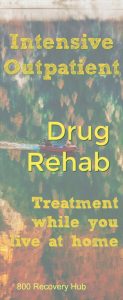An intensive outpatient program (IOP) is a kind of treatment service and support program used primarily to treat eating disorders , chemical dependency, addiction and alcohol abuse when the patient either has previously detoxed or does not need detoxification at a time of entering the program. Intensive Outpatient does not require the inpatient residential services typically offered by the larger, more comprehensive treatment facilities.
The typical Intensive Outpatient programs vary from one on one or group l services of 10–40 hours a week. Intensive Outpatient allows the individual to be able to participate in their daily affairs, such as work, and then participate in treatment at an appropriate facility in the morning or at the end of the day.
The typical Intensive Outpatient program encourages active participation in 12-step programs in addition to the IOP participation. IOP can be more effective than individual therapy for chemical dependency.
Intensive Outpatient is also used by some HMOs as a transitional treatment for patients just released from a residential treatment program.
Why choose an Outpatient Program
Cost
One reason might be cost. It will cost more to stay at a residential treatment center than to participate in an Outpatient Program. Residential treatment programs include room and board and maintain a full-time staff that is available 24 hours a day. Because Outpatient participants are not staying overnight or even eating all their meals and there, the treatment costs are going to be lower. Fewer resources are used in this type of program.
Live at Home
The familiarity and comfort of sleeping at home can be a major motivation for people to participate in Outpatient Treatment. Participants with alcohol problems and addiction can still feel they are part of their “normal life” as they may continue to attend school or work. For people who have responsibilities at the house, outpatient can make their life more manageable. It’s possible to continue helping the family with minor interruptions. They can continue to work and perform the various tasks of daily living. For example, they are still able to run errands, drop kids off at school and pick them up before shopping for groceries. This can help ground folks as they continue with their drug treatment. They also have a chance to try what they are learning in treatment to their daily routine.
Support at Home
Some people enjoy going through an Outpatient Treatment Program because it lets them take advantage of the supporting family they have at home. They have children, friends, and family who love and care about them. They are cheering for them to succeed. Participating in IOP care also gives people the opportunity to keep ties with their community, work or religious organizations they participate in. They are groups that provide them with support, friendship, and love. This can result in big benefits to those getting sober.
Group Therapy
A big part of the experience is group therapy. This is where participants meet to discuss their issues in front of an addiction counselor. The individuals will learn how to keep a healthier lifestyle without abusing drugs and alcohol. They have a safe and supportive place to discuss their problems. What’s really important is to share honestly and openly about what is going on with your emotions. People suffering from alcohol problems and addiction should share insights about their motivations to use drugs. Also, they need to share about the circumstances under which they started abusing substances. It’s an important part of the process of becoming more self-aware. This is critical for recovery. What’s more important is that, by participating in group therapy, individuals will see that they are not alone. They will benefit from hearing about the experiences of their peers.
Drug Testing
Part of making sure there is accountability in the recovery process, the use of drug testing is important. The participants will know that they may be tested randomly at any time. This can be a powerful motivation to avoid using drugs.
What happens at the end of treatment?
The facility will be constantly caring for each person as they go through the treatment program. The medical professional and staff have the experience, tool set and knowledge to help determine when it is appropriate to transition back to normal life. As participants become more confident in their sobriety, they gradually reduce the amount of participation in activities. For example, attend fewer group therapy sessions or arranging to take fewer individual counseling sessions. They will also learn about joining a 12-step program if they haven’t already begun one during their stay. They can also find out about getting help on an as-needed basis from a community or spiritual counselor. The participants will benefit from aftercare by learning ways to remain focused on their recovery when they complete the program. They will have the confidence, skills, and knowledge to remain sober on their own.